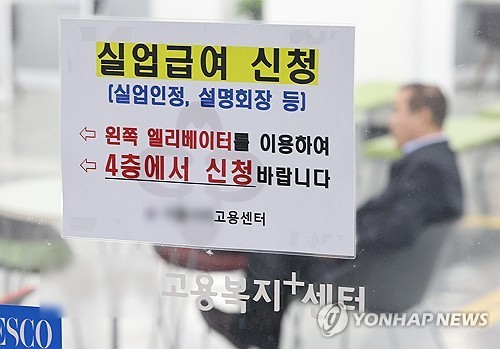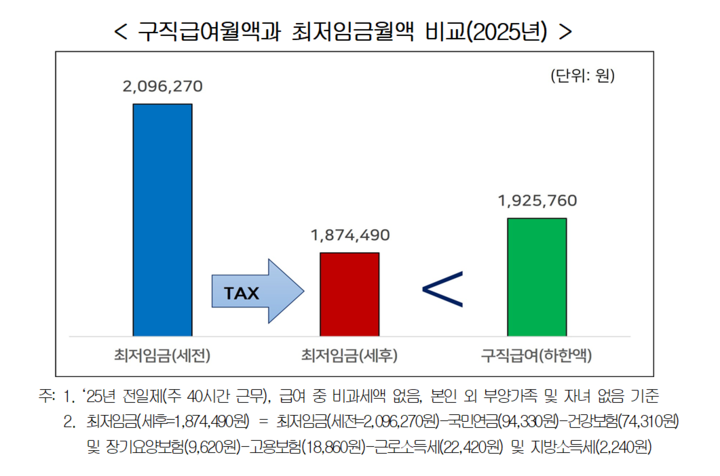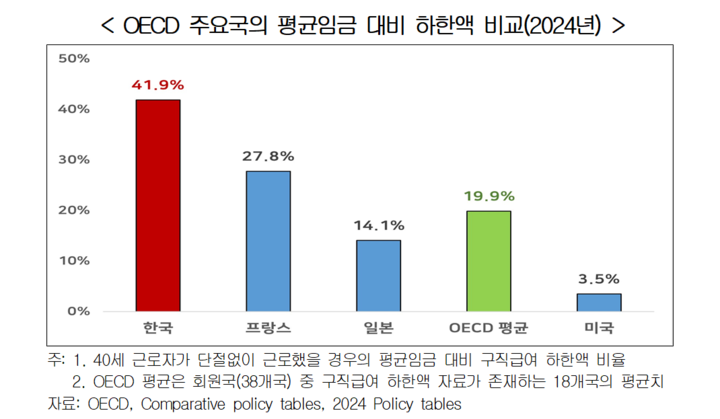Employers' federation calls for overhaul of unemployment insurance scheme amid rising benefit payouts
Study highlights rising cases of repeated claims and international comparisons of generous benefit thresholds

The Korea Employers Federation (KEF) has voiced serious concerns that South Korea’s current unemployment benefits system is undermining jobseekers’ motivation to seek employment, with payouts in some cases surpassing what individuals can earn through work.
On September 25, the KEF released a report entitled “Problems and Improvement Measures of the Employment Insurance System.” According to the publication, the core component of South Korea's unemployment insurance—known locally as “jobseekers allowance”—is intended to provide financial support for those who lose their jobs involuntarily and are actively looking for work, typically paying benefits for a period of 120 to 170 days to stabilize livelihoods and aid re-employment.
The minimum amount for the jobseekers allowance is set at 80% of the legal minimum wage. As the minimum wage has increased rapidly, the lower limit relative to the maximum allowance has risen sharply over the years: from 74% in 2010, to 87.5% in 2013, 90.4% in 2018, 91.1% in 2022, 95.6% in 2024, and a projected 97.3% in 2025.
For those receiving the minimum allowance, the monthly benefit is approximately 1.93 million KRW for 30 days—about 92% of the monthly minimum wage (2.10 million KRW for a 40-hour work week). After taxes, the take-home amount is around 1.88 million KRW, a figure that can sometimes exceed what recipients could earn by working for minimum wage. The KEF argues that this inverted structure has the unintended consequence of discouraging individuals from seeking employment.
Internationally, South Korea’s minimum jobseekers allowance is equivalent to about 41.9% of the national average wage. This far exceeds the shares seen in other major economies such as France (27.8%), Japan (14.1%), and the United States (3.5%).
Eligibility for unemployment benefits requires individuals to have worked at least 180 days (about seven months) during the past 18 months prior to unemployment. However, the report notes that after roughly seven months of employment, an individual can claim four months of jobseekers allowance, making it easier to cycle in and out of employment while relying on unemployment benefits.
This structure has led to a growing number of so-called “repeat recipients,” or those who claim unemployment benefits multiple times over a five-year period. The number has steadily climbed—from 86,000 in 2019 to 93,000 in 2020, 100,000 in 2021, 110,000 in 2022, and reaching 113,000 in 2024.
Despite this trend, there are currently no strict limitations on the number of times or amounts one can claim. The eligibility recognition rate stands at an astonishing 99.7%, suggesting that most applicants are approved upon request—a process the KEF criticizes as little more than a formality.


The primary intent of the jobseekers allowance is to help individuals facing unexpected layoffs; however, it is also being fully awarded to those retiring at the mandatory age. Additionally, the effectiveness of “early reemployment bonuses” is questionable, and their continued provision may undermine the system’s fiscal sustainability.
The report also points out the strain placed on the unemployment insurance fund by maternity and parental support programs, which aim to encourage work–family balance and prevent career interruptions for women through benefits like parental leave, reduced working hours during childcare, and maternity leave allowances. However, spending on these programs from the unemployment insurance account—rather than from a more appropriate funding source—has negatively impacted the fund’s fiscal stability.
By contrast, many advanced economies manage maternity and parental benefits separately from employment insurance, funding them through taxation or dedicated funds. With Korea facing rapidly declining birth rates and a rapidly aging society, the KEF projects that the scale of maternity and parental support will further expand, presenting an even greater fiscal burden in the future.
To address these issues, the KEF has proposed a series of reforms. Chief among them is eliminating the minimum threshold for jobseekers allowance, instead setting benefit levels at 60% of the average wage, in line with international standards. The eligibility period and required contribution should also extend from the current 18 months and 180 days to 24 months and 12 months, respectively.
The report also calls for benefit reductions for repeat claimants, a more robust system for verifying eligibility and job search efforts, and stricter penalties to prevent moral hazard. Further, it recommends scaling back or abolishing early reemployment bonuses and improving overall fund efficiency.
Regarding maternity and parental benefits, the KEF suggests shifting primary responsibility to the state, rather than financing them from the unemployment insurance account. In the short term, this would involve increasing government funding for employment insurance; in the long term, the proposal is to transfer all maternity and parental support to the general government budget.
Photo credits: Yonhap News, Korea Employers Federation
Note “This article was translated from the original Korean version using AI assistance, and subsequently edited by a native-speaking journalist.”
Photo=Yonhap News, Korea Employers Federation
추천 뉴스
- 1 Japanese Prime Minister Shigeru Ishiba to Visit Korea for Summit with President Lee in Busan Japanese Prime Minister Shigeru Ishiba will visit South Korea for a two-day trip starting September 30, attending a summit with President Lee Jae-myung in Busan.On September 26, Kang Yu-jeong, spokesperson for the Office of the President, officially announced the visit during a press briefing at the
- 2 Suicide Overtakes Cancer as Leading Cause of Death Among People in Their 40s in 2024 The number of deaths due to intentional self-harm, commonly referred to as suicide, has reached its highest point in 13 years, according to new figures released by Statistics Korea on September 25.The annual "Statistics on Causes of Death 2024" report revealed that a total of 14,872 people lost thei
- 3 Former President Yoon Seok-yeol Appears in Court on Insurrection Charges After Skipping Eleven Hearings Former President Yoon Seok-yeol appeared in court for the first time in 85 days, attending his formal trial after being additionally indicted by the special prosecutor’s team on charges of leading an insurrection.The trial, presided over by Chief Judge Baek Dae-hyun of the 35th Criminal Division at
- 4 Jang Wonyoung Chosen as MC for Music Bank Global Festival, Shining Beyond Her Visuals Singer Jang Wonyoung has been actively expanding her career across various fields, recently updating fans with new posts on social media.On September 26th, around 1 a.m., Jang Wonyoung posted several photos and a brief emoticon message on her personal social media account.The pictures show Jang Wony
- 5 Saturday Concert Highlights: What to Do This Weekend in Seoul’s Daehakro, Gangnam, and Chang-dong Looking to fill your Saturday with music? Here’s a curated roundup of some of the most anticipated concerts happening this weekend across Seoul, from Chang-dong and Daehakro to Gangnam.2025 OPCD STAGE: DISCOVERY On Saturday, September 27, the "2025 OPCD STAGE: DISCOVERY" concert, hosted by the Dobon
- 6 Tokyo's First Yun Dong-ju Memorial to Be Unveiled at Rikkyo University in October A memorial dedicated to the influential Korean poet Yun Dong-ju will be unveiled for the first time in Tokyo at Rikkyo University this October.Rikkyo University, located in Ikebukuro, Toshima, Tokyo, announced on September 25 that it will hold the unveiling ceremony for the Yun Dong-ju Memorial on O
- 7 SEVENTEEN’s Hoshi Unveils Fall Pictorial, Showcasing the Essence of Classic and Trendy Fashion Hoshi, a member of the group SEVENTEEN, exuded a chic and sophisticated aura in a new fall-themed, black-and-white pictorial. According to PLEDIS Entertainment, Hoshi was recently featured on the cover of the October issue of the fashion and lifestyle magazine Allure Korea, released on September 25.
- 8 Tzuyu Launches Solo Career with First Official Trailer Tzuyu has officially opened a new chapter in her musical career by unveiling her first solo trailer. On September 26 at 1 p.m. KST, Tzuyu, former member of TWICE, is set to release the 'BLINK' OFFICIAL TRAILER as part of her highly anticipated solo promotions. The trailer will be revealed sequential
- 9 President Lee Jae-myung Leads UN Security Council's First Open Debate on AI and Global Security President Lee Jae-myung presided over an unprecedented open debate on "Artificial Intelligence and International Peace and Security" at the United Nations Security Council, marking a historic moment as the first Korean leader to lead a Security Council meeting.Held at the UN headquarters in New York
- 10 Romance Reaches its Peak Between Im Yoon-ah and Lee Chae-min in 'The Tyrant's Chef' Actors Im Yoon-ah and Lee Chae-min are stirring viewers’ hearts with their intensifying romance in 'The Tyrant's Chef'.On the upcoming episode of tvN’s weekend drama ‘The Tyrant’s Chef’, airing on the 27th, chef Yeon Ji-young (played by Im Yoon-ah) finds herself completely enchanted by the direct an
